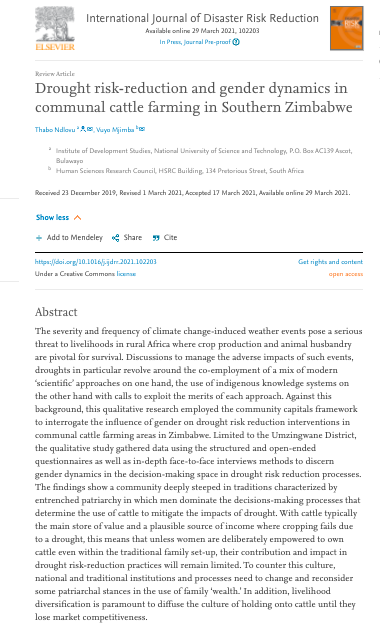Drought risk-reduction and gender dynamics in communal cattle farming in Southern Zimbabwe

ABSTRACT
The severity and frequency of climate change-induced weather events pose a serious threat to livelihoods in rural Africa where crop production and animal husbandry are pivotal for survival. Discussions to manage the adverse impacts of such events, droughts in particular revolve around the co-employment of a mix of modern ‘scientific’ approaches on one hand, the use of indigenous knowledge systems on the other hand with calls to exploit the merits of each approach. Against this background, this qualitative research employed the community capitals framework to interrogate the influence of gender on drought risk reduction interventions in communal cattle farming areas in Zimbabwe. Limited to the Umzingwane District, the qualitative study gathered data using the structured and open-ended questionnaires as well as in-depth face-to-face interviews methods to discern gender dynamics in the decision-making space in drought risk reduction processes. The findings show a community deeply steeped in traditions characterized by entrenched patriarchy in which men dominate the decisions-making processes that determine the use of cattle to mitigate the impacts of drought. With cattle typically the main store of value and a plausible source of income where cropping fails due to a drought, this means that unless women are deliberately empowered to own cattle even within the traditional family set-up, their contribution and impact in drought risk-reduction practices will remain limited. To counter this culture, national and traditional institutions and processes need to change and reconsider some patriarchal stances in the use of family ‘wealth.’ In addition, livelihood diversification is paramount to diffuse the culture of holding onto cattle until they lose market competitiveness.